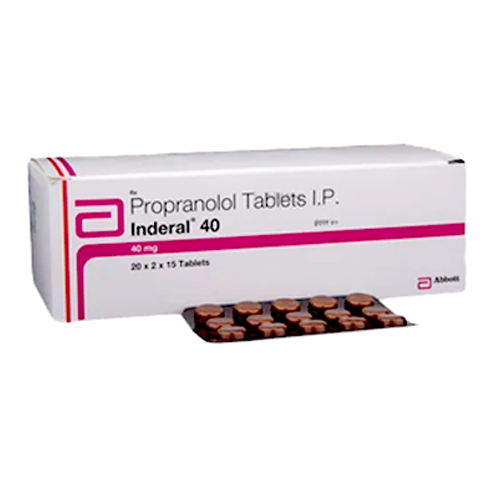Description
Propranolol is a beta-blocker used for prophylaxis of migraine. Beta-blockers affect the heart and circulation (blood flow through arteries and veins). Propranolol is used to treat tremors, angina (chest pain), hypertension (high blood pressure), heart rhythm disorders, and other heart or circulatory conditions. It is also used to treat or prevent heart attack, and to reduce the severity and frequency of migraine headaches.
A widely used non-cardioselective beta-adrenergic antagonist. Propranolol is used in the treatment or prevention of many disorders including acute myocardial infarction, arrhythmias, angina pectoris, hypertension, hypertensive emergencies, hyperthyroidism, migraine, pheochromocytoma, menopause, and anxiety.
Propranolol may also be used for purposes not listed in this medication guide.
Pharmacodynamics
Propranolol, the prototype of the beta-adrenergic receptor antagonists, is a competitive, nonselective beta-blocker similar to nadolol without intrinsic sympathomimetic activity.
Propanolol is a racemic compound; the l-isomer is responsible for adrenergic blocking activity.
Mechanism of action
Propranolol competes with sympathomimetic neurotransmitters such as catecholamines for binding at beta(1)-adrenergic receptors in the heart, inhibiting sympathetic stimulation.
This results in a reduction in resting heart rate, cardiac output, systolic and diastolic blood pressure, and reflex orthostatic hypotension.
You should not use this medicine if you have asthma, very slow heart beats, or a serious heart condition such as “sick sinus syndrome” or “AV block” (unless you have a pacemaker).
Side effects
All medicines may cause side effects, but many people have no, or minor, side effects.Some medical conditions may interact with Propranolol.
Tell your doctor or pharmacist if you have any medical conditions.
Common propranolol side effects may include: nausea, vomiting, diarrhea, constipation, stomach cramps, decreased sex drive, impotence, or difficulty having an orgasm, sleep problems (insomnia) or tired feeling.
Symptoms of overdose include bradycardia, cardiac failure, hypotension, and brochospasm.
This is not a complete list of all side effects that may occur. If you have questions about side effects, contact your health care provider.


Reviews
There are no reviews yet.